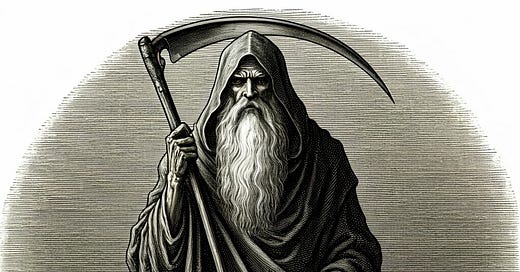Time is a tricky old codger, metaphysically, physically, practically, and yes, for writers of fiction. I started down this particularly mind-bending rabbit hole after a conversation with an extremely talented writer friend, who was musing about whether to differentiate between the experiences of two of her characters by writing of the experiences of one in third person past and the other in first person present. My response to this in a moment, but before that I’d like to dawdle for a moment around the prickly margins of the wonderful thicket of thoughts that exist about time itself.
On a purely practical basis, we all are, to a greater or lesser extent, governed by time. We arrange the actions of our days and weeks into more or less logical sequences - if I’m going to have milk in my coffee, then I need to ‘make time’ to go to the supermarket. We have watches and smartphones, diaries and calendars, all setting out a sequence of days, weeks, months which seem to offer us a past, a present and a future. And that’s convenient and conventional.
Whether we actually experience our lives in that neat sequential way is highly debatable and has long been debated. For contemporary physicists, there are, as far as I understand it (and that is really, really not very far), there are two useful ways of conceiving of time. One is the spacetime continuum, which is a mathematical model that combines the three dimensions of space (length, width, and height) with the one dimension of time into a single four-dimensional entity. It's a way of understanding how events occur in a unified way, rather than as separate spatial locations and points in time. On the other hand, you can work with the notion of quantum time, which explores the possibility that time, as we understand it, may not be a fundamental, continuous flow but rather a phenomenon that emerges from quantum processes, potentially with non-linear or even backward-flowing aspects. This concept suggests that time, at its most basic level, may be discrete, quantised, and not necessarily unidirectional. Which is enough to make your head explode.
Quantised time can, perhaps, be seen as not being far off from the view of the analytical philosopher John M. McTaggart, who suggested in his B-theory that time does not flow, and there is no moving ‘now’ in which we exist, as if standing on a tread on the escalator of life, but that rather past, present and future are all equally real, and, to quote Brian Garrett, “‘now’ is purely indexical, any utterance of which refers to its time of utterance; there is no objective present to keep track of.”
For Henri Bergson, on the other hand, time as it is experienced is characterised by its fluidity, indivisibility, and subjective nature. It's not a collection of discrete moments but a seamless flow - a duration. In contrast, Husserl focuses rather more on time-consciousness, which closely interconnects with his account of the givenness of sensuous objectivity. His view on time centres on the idea of an extended or “living” present, which involves not only the momentary now but also retentions and protentions, extending it into the past and into the future. For myself, as a writer, that seems the most helpful view to adopt.
None of this, though, takes account of that other dictator of sequences which dominates how we can think and speak, and that is the enforced order of syntax. Syntax isn’t just that rather deadly topic we studied at school—it’s the puppet master of thought, pulling the strings on how we form ideas. And syntax enforces sequence. We, quite literally, can only communicate by putting one word after another.
As writers of fiction, we are constantly making choices, and one of those choices is how closely we want to convey lived experience. The trouble with lived experience is that, as we’ve just seen, it’s partial, fragmentary, allusive, and incomplete. But, I would contend, we write and read stories in order to have a sense of something that is, by contrast, coherent, comprehensible and complete. So, although writing a narrative in the first person present may be more accurate, it may also make the reader more uncomfortable. Equally, the first person narrator can only, by definition, have a very narrow view, limited by what they, as an individual, can know and see. In competitive diving terms, writing first-person present narrative ranks as a high degree of difficulty - but that doesn’t mean you shouldn’t do it. And if anyone can pull it off, my colleague Elika can.








Love this, Sarah! I have been thinking a lot about time, lately - not only in fiction, but also the stress of linear time, as in deadlines and the discipline of it all, while sometimes helpful, at times stagnates creativity and enjoyment of it all, for me at least. This piece has given me a lot to think about, thanks for writing it and for mentioning me!